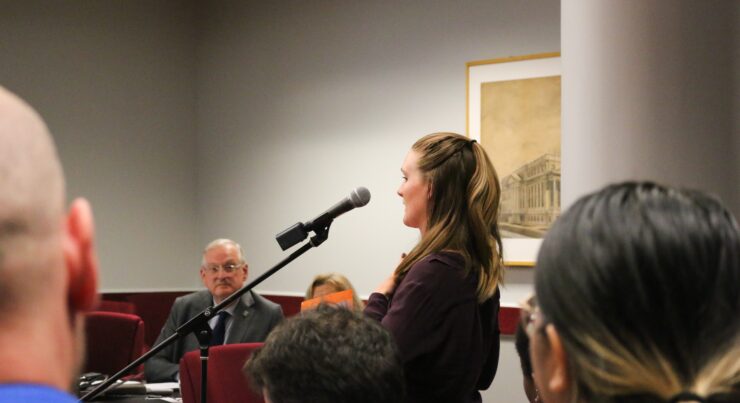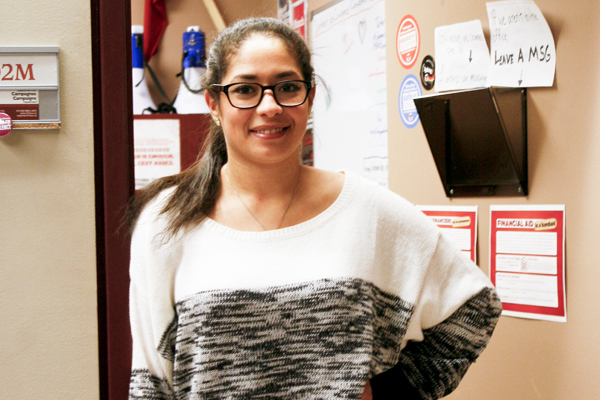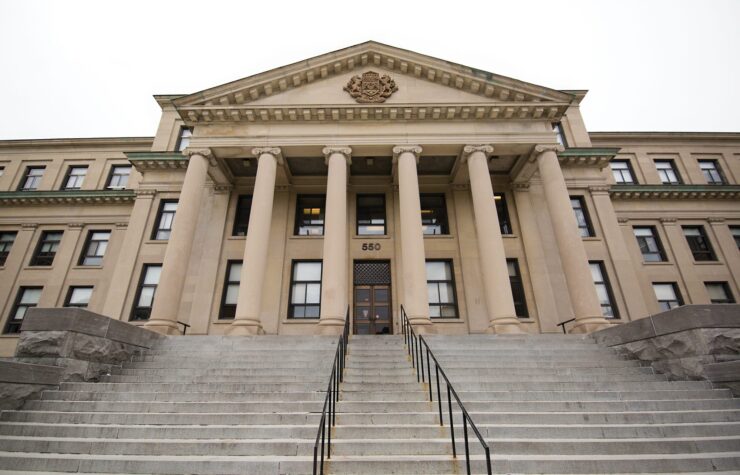Five of the six candidates gathered to discuss and debate their party platforms on the environment
Less than three weeks before the Oct. 21 federal election and less than one week after the Global Climate Strike on Sept. 27, Ottawa-Vanier candidates engaged in a public debate on the environment on Thursday evening.
The event was part of a cross-Canada initiative, 100 Debates on the Environment, which promotes non-partisan discussion on environmentalism leading up to the election.
A full house was joined by Liberal candidate Mona Fortier, NDP candidate Stéphanie Mercier, Green Party candidate Oriana Ngabriano, People’s Party of Canada candidate Paul Durst, and Communist Party candidate Michelle Paquette. Although invited, Conservative candidate Joel Bernard did not attend.
The debate began with a series of two-minute introductions.
Fortier opened, reviewing the Liberal’s environment file over the past four years and their platform for a second term, which includes banning single-use plastics and planting two billion trees.
“No government has been better than us at fighting climate change,” she said.
Durst followed, denying the existence of a climate crisis.
“Everyone on this board agrees the climate is changing — I don’t know how this is happening and I certainly don’t buy into there being a climate crisis,” Durst said.
United Nations experts released a 700-page report last October where they found we have just 12 years to make the monumental changes needed to keep global warming below 1.5 C. The report drew together 6,000 scientific publications and was reviewed by over 1,000 scientists.
Ngabriano’s opening focused on the Green belief that cross-party collaboration is the best approach to tackling the climate crisis.
Mercier’s opening, and much of her subsequent debate, consisted of veiled jabs at the incumbent Liberals.
“It’s time we fight climate change like we actually want to win,” she said.
Paquette pinned the climate crisis on the structure of Canadian society.
“Our profit-driven capitalist system is destroying our environment,” she said.
The debate portion began after. Moderators began with a reminder that First Nations peoples have been championing the cause of environmental responsibility for decades and have been met with nothing but continued oppression. They urged the audience to include First Nations perspectives when considering the climate crisis.
The first question focused on the key climate elements of each party’s platform.
Durst answered first, disagreeing with the phrasing of the question altogether. The PPC has proposed withdrawing from the 2015 Paris Agreement and revoking the carbon tax.
The remaining candidates proposed varying degrees of environmental protectionism.
The Liberal Party proposed removing carbon from the atmosphere, although Fortier neglected to go into detail about how exactly they planned on doing so.
“It’s just the beginning,” she said.
“Just the beginning? It’s been four years,” responded Mercier.
Mercier said the NDP planned on reaching net-zero emissions in 2030, protecting triple the land and water than the current percentage, and setting a goal of preventing warming to climb any higher than 1.5 degrees.
Ngabriano added that while the benchmark goals for the Green Party were the same as the NDP, they also intended on ending the pipeline project and investing in a livable income.
“You don’t care about plastic or paper if you can’t put food on the table,” she said.
Paquette offered a sweeping environmental platform that included stopping resource extraction such as fracking, pipelines, and tar sands, and penalizing corporations for non-compliance, with consequences including jail time.
The debate continued for over two hours, bridging topics such as pollution, investment in government science, and protecting green spaces and wildlife.
Notable arguments include the Green Party’s plan to address pollution, which involves limiting the approval of toxic chemicals and investing in greener public transit.
She also suggested the construction of wildlife bridges. “Every time we endanger one aspect of life we endanger the whole life cycle,” she said.
Fortier said the Liberal’s promise to plant two billion trees will create seasonal jobs, part of the Liberal plan to make the transition away from an unsustainable economy as easy as possible for Canadian workers.
This plan also includes investing in schools and transit so they can get the green technology they need to be competitive in a sustainable economy.
Mercier took care to remind the audience of Liberal expenditures, including $3.3 billion on fossil fuel subsidies and $4.5 billion on the pipeline project. She says that if this money was redirected into the transition, Canadians could expect it to go smoothly.
Durst said the PPC would not be investing in governmental scientific research or develop a broad-scale, national climate policy, but rather would be shifting the focus to the local level.
He also argued that lowering taxes and removing “red tape” will lead to Canadians who are more environmentally sustainable.
Paquette’s main arguments were surrounding the prevention of urban sprawl and the development of green spaces, as well as cutting military expenditure by 75 per cent.
She argued that the military is one of the world’s largest producers, and the money recovered from its budget could be reinvested into things such as public transit and improving infrastructure to better weather natural disasters.
Following the question period, selected questions submitted to the moderator by audience members before the debate were read and answered. Most covered a lot of the same ground as those posed during the debate, including adjustments in the agriculture industry and preserving Canadian jobs.
One question that united all five candidates was about awarding protected status to Gatineau Park.
The closing statements summarized the platforms and defended the arguments made throughout the course of the debate. They all expressed their gratitude for the turnout and the show of civic engagement.
The ballots will be cast on Oct. 21. Online voter registration is open and can be accessed here any time before Oct. 15.





